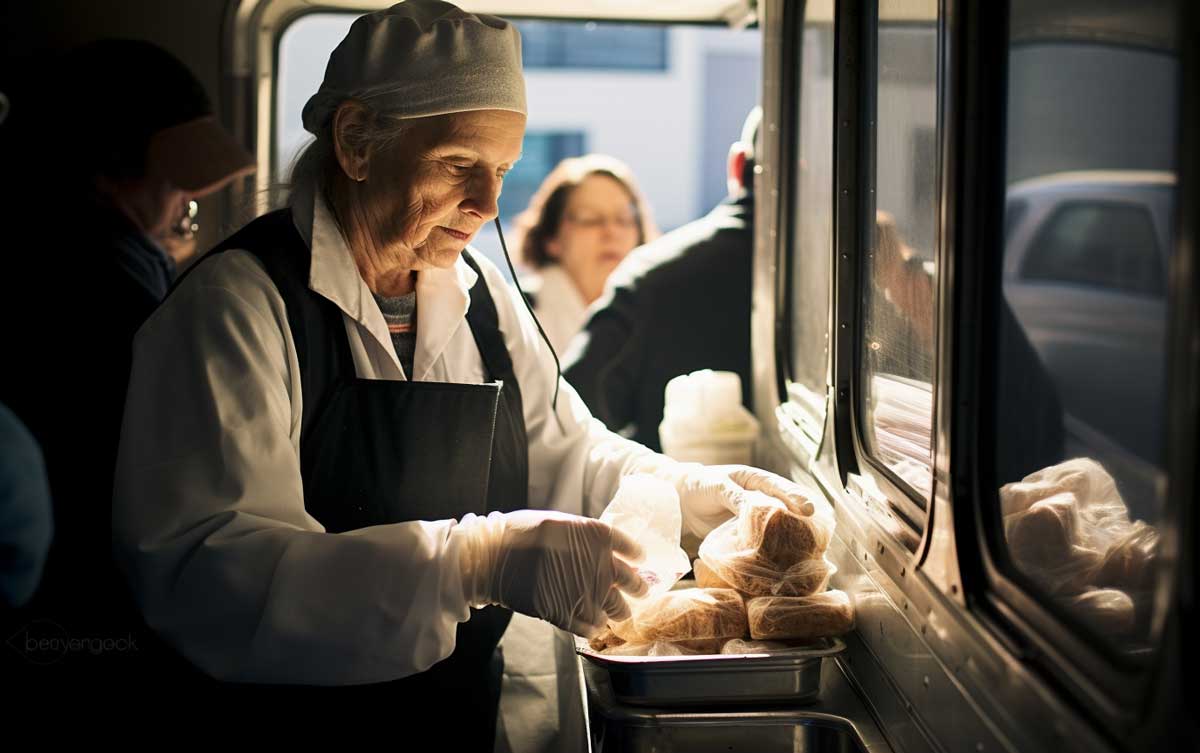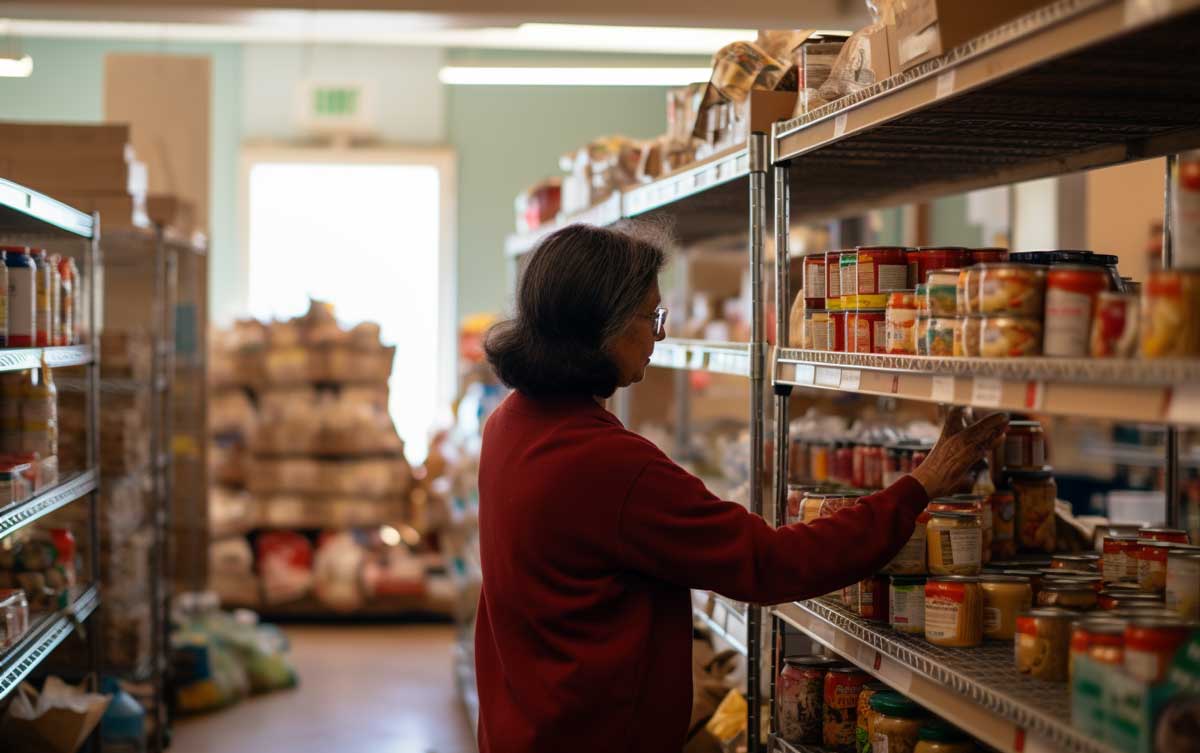Food banks play a pivotal role in alleviating hunger and providing essential food items to those in need. With the increasing demand for their services, it's crucial to know what items are most beneficial to donate.
This article delves into the intricacies of food banks and provides a comprehensive guide on the best items to donate and what not to donate to a food bank.
What Is A Food Bank?
A food bank is a non-profit organization that collects, stores, and distributes food to people in need through a network of community-based agencies. These agencies can include soup kitchens, shelters, and other community-based organizations. The primary goal of a food bank is to combat hunger and ensure that everyone has access to nutritious food.
What Can Be Donated To A Food Bank?
When considering donations, it's essential to focus on non-perishable items that have a longer shelf life and can be stored without refrigeration. Here are some of the most sought-after items by food banks:
-
Peanut Butter: A favorite among both children and adults, peanut butter is rich in protein and can be used in various recipes.
-
Canned Proteins: This includes canned tuna, salmon, chicken, and other meats. These are essential sources of protein and can be easily stored.
-
Canned Beans: Beans are a great source of fiber and protein. They can be used in numerous dishes and are a staple in many households.
-
Pasta & Pasta Sauce: A versatile and filling option, pasta, along with its sauce, can make for a wholesome meal.
-
Pantry Staples: Items like rice, quinoa, and oats are always in demand. They are nutritious and can be used in various dishes.
-
Canned Vegetables: Opt for low-sodium options if possible. Vegetables are a crucial source of vitamins and minerals.
-
Cooking Essentials: Olive oil, spices, and other cooking essentials are always welcome. They help in preparing a variety of dishes.
-
Formula: For families with infants, formula can be a lifesaver. It's essential to ensure that babies get the nutrition they need.
-
Canned Fruits: Opt for those in their natural juice rather than syrup. Fruits provide essential vitamins and are a healthy snack option.
In addition to food items, consider donating essential non-food items. These can include toothbrushes, toothpaste, deodorant, shower gel, shampoo, sanitary products, and diapers. Such items are often overlooked but are crucial for maintaining personal hygiene.
It's also worth noting that while all donations are appreciated, it's best to avoid items that are expired, opened, or damaged. Always check the expiration date before donating and ensure that the items are in good condition.
Perishable Foods
While non-perishable items are often the most common donations to food banks due to their long shelf life, perishable foods are equally essential. These foods provide fresh and nutritious options for families and individuals in need. However, donating perishable items requires a bit more care and consideration to ensure they remain safe for consumption.
Refrigerated Items
Refrigerated items are those that need to be kept cold to maintain their freshness and prevent spoilage. Some of the most sought-after refrigerated items by food banks include:
-
Dairy Products: This includes milk, cheese, and yogurt. Dairy is a significant source of calcium and vitamin D, essential for bone health.
-
Fresh Meats: Lean meats such as chicken, turkey, and fish are excellent sources of protein.
-
Eggs: A versatile food item, eggs are rich in protein and can be used in various dishes.
-
Fresh Juices: Opt for those without added sugars.
It's crucial to ensure that refrigerated items are kept at the proper temperature during transportation to the food bank. Using coolers or insulated bags can help maintain the right temperature.
Frozen Items
Frozen foods can be a valuable donation as they tend to have a longer shelf life than refrigerated items yet still offer the nutritional benefits of fresh foods. Some key frozen items that food banks appreciate include:
-
Frozen Vegetables And Fruits: These are packed at the peak of their freshness and retain most of their nutritional value.
-
Frozen Ready-Made Meals: Soups, stews, pastas, and casseroles can provide a complete, nutritious meal for families.
-
Frozen Meats: Like fresh meats, frozen meats such as chicken breasts, ground beef, and fish fillets are high in protein.
When donating frozen items, ensure they remain frozen during transportation. Using coolers can help maintain the frozen state.
Produce & Dairy Products
Fresh produce and dairy products are essential for a balanced diet:
-
Fresh Produce: Vegetables and fruits are packed with vitamins, minerals, and fiber. Popular options include apples, oranges, carrots, and leafy greens.
-
Dairy: As mentioned, dairy products like milk, cheese, and yogurt are rich in calcium and vitamin D. They're also a source of protein and other essential nutrients.
When donating produce and dairy, it's vital to ensure they are fresh and not close to their expiration date. Also, consider the storage capabilities of the food bank. Some might not have the necessary refrigeration or freezer space to store large quantities of perishable items.
Non-Perishable Foods
Non-perishable foods are essential for food banks as they have a longer shelf life and can be stored without refrigeration. These items provide sustenance to families and individuals in need, ensuring they have access to nutritious meals even when fresh foods are not available.
Canned And Dried Food Items
Canned and dried foods are staples in food bank donations due to their longevity and ease of storage. Some of the most valuable items in this category include:
-
Canned Beans: Such as black beans, garbanzo beans, and pinto beans, which are high in protein and fiber.
-
Canned Meats: Including tuna, salmon, and chicken, these provide essential proteins.
-
Canned Vegetables: Preferably low-sodium options, which offer vital vitamins and minerals.
-
Canned Fruits: Those preserved in their natural juice are healthier than those in syrups.
-
Dried Grains: Items like rice (preferably brown), quinoa, and whole grain pasta are versatile and nutritious.
-
Nuts And Seeds: Such as almonds, walnuts, and flaxseeds, which are rich in essential fatty acids and proteins.
Baby Food And Formula
For families with infants, baby food and formula are crucial. These items ensure that babies receive the nutrition they need during their critical developmental stages:
-
Baby Formula: While breastfeeding is recommended, many families rely on formula. Donating various types ensures that babies get the right formula suitable for their needs.
-
Jarred Baby Foods: Including fruits, vegetables, and meats. These provide a range of essential nutrients for growing babies.
-
Baby Cereals: Such as rice cereal or oatmeal, which are often the first solid foods introduced to infants.
It's worth noting that while many food banks appreciate baby food and formula donations, some have specific guidelines due to safety concerns. Always check with the food bank before donating these items.
Specialty Foods
Specialty foods cater to specific dietary needs or preferences. As diverse populations access food banks, these items can be invaluable:
-
Gluten-Free Products: For those with celiac disease or gluten sensitivities.
-
Diabetic-Friendly Foods: Low in sugars and carbohydrates.
-
Vegan And Vegetarian Options: Such as plant-based proteins and dairy alternatives.
-
Ethnic Foods: Catering to the diverse cultural backgrounds of those accessing the food bank, including items like tortillas, soy sauce, or curry pastes.
Non-Food Items That Should Not Be Donated To Food Banks
While food banks primarily focus on providing food to those in need, they also accept non-food items that can assist individuals and families in their daily lives. However, there are certain non-food items that are not suitable for donation due to various reasons. Here's a closer look at some of these items and the rationale behind not donating them.
Glass Containers And Bottles
Glass containers, while recyclable and environmentally friendly, pose a risk in food bank settings:
-
Breakage: Glass containers can easily break during transportation or storage, leading to potential injuries and contamination of other items.
-
Weight: Glass is heavier than plastic, making transportation more challenging and costly.
-
Storage Issues: Broken glass can contaminate food items, making them unsafe for consumption.
While glass containers are excellent for home use, their potential risks outweigh their benefits in a food bank setting.
Olive Oil Or Any Other Type Of Oil Or Liquid
While oils are essential cooking ingredients, there are concerns associated with donating them to food banks:
-
Spillage: Oils, especially in glass containers, can spill and contaminate other items.
-
Storage: Oils require specific storage conditions to prevent them from becoming rancid. Not all food banks have the facilities to store them appropriately.
-
Packaging: Many oils come in glass bottles, which, as mentioned, pose breakage risks.
It's always best to check with the food bank before donating any oils or liquids to ensure they can handle and distribute them safely.
Personal Kitchen Supplies And Utensils
Kitchen supplies and utensils, while useful, are not always suitable for food bank donations:
-
Sanitation Concerns: Used kitchen supplies might not be adequately cleaned, posing hygiene issues.
-
Mismatched Items: Donating random kitchen items can lead to an accumulation of mismatched utensils, which might not be useful for recipients.
-
Storage Space: Food banks have limited storage space. Storing non-essential items can take away space needed for food storage.
Instead of donating personal kitchen supplies to food banks, consider giving them to thrift stores or organizations that specifically cater to individuals setting up new homes.
Monetary Donations To Consider Instead Of Donating Physical Food Items
While donating physical food items to food banks is a commendable act, monetary donations can sometimes have a more significant impact. Here's a closer look at the benefits and reasons to consider monetary donations over physical food items:
-
Maximized Impact: Food banks often have partnerships with local farmers, wholesalers, and retailers. This means they can purchase food at discounted rates, stretching each dollar further than an individual might be able to. For instance, a single dollar donated can provide multiple meals, maximizing the impact of the donation.
-
Tailored Purchases: Monetary donations give food banks the flexibility to buy what they need most at any given time. This ensures that they can maintain a balanced inventory and address any immediate shortages.
-
Reduced Handling Costs: Physical food donations require sorting, storage, and sometimes even disposal if the items are not suitable. Monetary donations eliminate these logistical challenges, ensuring more resources are directed towards feeding those in need.
-
Fresh Produce: With monetary donations, food banks can purchase fresh produce, which might not be commonly donated. Fresh fruits and vegetables are essential for a balanced diet and can make a significant difference in the nutritional value of the meals provided.
-
Support Local Economy: By purchasing from local suppliers, food banks can support the local economy, creating a positive ripple effect in the community.
-
Efficiency: Monetary donations can be processed quickly, allowing food banks to respond promptly to emergencies or increased demand.
-
Reduced Waste: Monetary donations allow food banks to purchase exactly what they need, reducing the chances of waste due to excess or unsuitable donations.
-
Support Operational Costs: While food is the primary concern, food banks also have operational expenses, such as transportation, storage, and utilities. Monetary donations can help cover these costs, ensuring the food bank operates efficiently.
Frequently Asked Questions
To help you better understand what not to donate to a food bank, we've answered some of the most frequently asked questions.
Why are monetary donations sometimes preferred over physical food items at food banks?
Monetary donations offer food banks flexibility in purchasing what they need most, often at discounted rates. They can also reduce handling costs and allow for the acquisition of fresh produce.
Can I donate perishable foods to food banks?
Yes, many food banks accept perishable foods like fresh produce and dairy products. However, it's essential to ensure they are fresh and to check with the food bank regarding their storage capabilities.
Are there items that food banks typically do not accept?
Some items, such as glass containers, certain oils, and personal kitchen supplies, might not be suitable for donation due to safety or logistical reasons. It's always best to check with the food bank beforehand.
How do food banks use monetary donations?
Food banks use monetary donations to purchase food items, support operational costs, and sometimes invest in community programs. They can often buy food at discounted rates, maximizing the impact of each dollar.
Is it safe to donate baby food and formula?
While many food banks appreciate donations of baby food and formula, some have specific guidelines due to safety concerns. Always check with the food bank before donating these items.
How can I ensure my donated items are suitable for the food bank?
It's always a good practice to check expiration dates, ensure items are unopened and undamaged, and contact the food bank to inquire about their current needs and guidelines.
Donating To A Food Bank
With so many people facing food insecurity today, food banks serve as a beacon of hope. Whether you're considering donating food items or making a monetary contribution, every bit helps in making a difference. By understanding the intricacies of what not to donate to a food bank and what to donate, you can ensure your contributions have the most significant impact. Let's all play our part in creating a world where no one goes to bed hungry.
Discover more food assistance programs by reading our comprehensive guide to finding food pantries near you. Visit Gov Relations to find more information and browse through the available resources.







